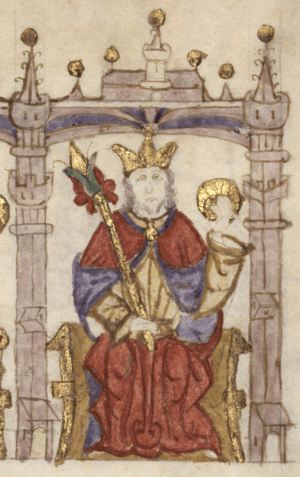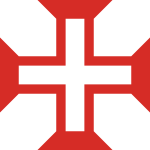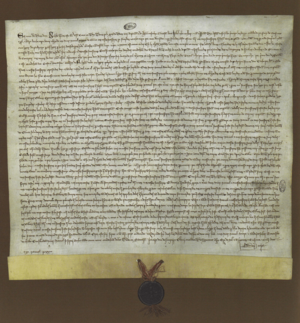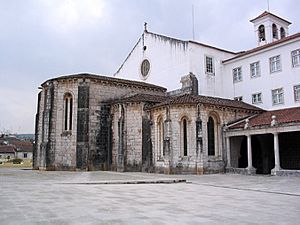Denis of Portugal facts for kids
Quick facts for kids Denis |
|
|---|---|

|
|
| King of Portugal | |
| Reign | 6 February 1279 – 7 January 1325 |
| Predecessor | Afonso III |
| Successor | Afonso IV |
| Born | 9 October 1261 Lisbon, Portugal |
| Died | 7 January 1325 (aged 63) Santarém, Portugal |
| Burial | St. Denis Convent, Odivelas, Portugal |
| Spouse | Saint Elizabeth of Aragon |
| Issue | Constança, Queen of Castile Afonso IV, King of Portugal |
| House | Burgundy |
| Father | Afonso III, King of Portugal |
| Mother | Beatrice of Castile |
| Religion | Roman Catholicism |
| Signature | |
Denis (also known as Dinis or Diniz) was the King of Portugal from 1279 to 1325. He was born on October 9, 1261, and passed away on January 7, 1325. People often called him the Farmer King (Rei Lavrador) because he cared a lot about farming. He was also known as the Poet King (Rei Poeta) because he wrote beautiful poems.
Denis was the oldest son of King Afonso III of Portugal and his wife, Beatrice of Castile. He became king after his father in 1279. In 1281, he married Elizabeth of Aragon, who later became a saint in the Catholic Church. King Denis ruled Portugal for more than 46 years, making many important changes to help his country grow.
Contents
How Did King Denis Rule?
Making Portugal Stronger
King Denis worked hard to make Portugal's government stronger. In 1290, he made Portuguese the official language for all legal matters. This was a big step for the country's identity. He also created the first university in Portugal, called the Estudo Geral, to help people learn.
He encouraged the economy by creating new towns and trade fairs. He supported Portuguese merchants and even helped set up the Bolsa de Comércio in 1293. This was one of the first forms of marine insurance in Europe, helping traders protect their goods at sea.
Developing Resources and Trade
King Denis cared about Portugal's resources. He encouraged the search for and use of minerals like sulphur, silver, tin, and iron. He also organized the export of extra farm products, salt, and salted fish to countries like England, Flanders, and France.
In 1308, he signed the first trade agreement between Portugal and England. To build a strong navy, he hired a skilled sailor from Genoa, Manuel Pessanha, in 1317. Pessanha became the first hereditary admiral of the Portuguese fleet, which helped create Portugal's navy.
The Knights Templar and New Orders
King Denis also dealt with the Catholic Church. When the Knights Templar were disbanded in Europe, Denis created a new Portuguese military order in 1319. This was the Order of Christ. It was meant to continue the work of the Templars in Portugal. He made sure this new order could take over the Templars' lands and properties.
King Denis and Culture
Founding the First University
During King Denis's time, Lisbon became a very important place for culture and learning in Europe. He founded Portugal's first university in 1290. It offered classes in arts, law, and medicine. The university moved between Lisbon and Coimbra several times before settling permanently in Coimbra in 1537.
A King Who Wrote Poems
King Denis loved arts and sciences. He studied literature and wrote books about many topics, from how to run a government to hunting and poetry. He also had many books translated into Galician-Portuguese, which was the language spoken then.
He supported poets and musicians called troubadours. He even wrote his own lyric poetry. His most famous work is the Cantigas de Amigo, a collection of love songs and funny songs. These songs helped develop poetry in the Iberian Peninsula. We still have 137 of his songs today. In 1990, a special discovery called the Pergaminho Sharrer was found. It contains some of his love songs with musical notes!
A Brave Hunter
King Denis also enjoyed hunting. There's a story that in 1294, while hunting near Beja, a bear attacked him and his horse. It's said that he fought the bear alone and killed it with a dagger. To remember this event, he had a live bear brought to his palace for entertainment.
How King Denis Managed the Country

Working with the Church
Before he became king, Denis helped his father with government tasks. At that time, Portugal often had disagreements with the Catholic Church. When Denis became king, he worked to make things better with the Church.
However, he also made laws to limit the Church's power. For example, he stopped the Church and religious groups from buying more land. He also made sure that the Order of Santiago in Portugal was separate from the one in Castile.
Keeping the Peace and Borders
King Denis was more of an administrator than a warrior. He did have a short war with Castile in 1295. But in 1297, he signed the Treaty of Alcañices. This treaty set the current borders between Portugal and Castile. It also created a 40-year peace and alliance between the two countries.
He continued his father's work on laws and centralizing power. He created new laws to protect common people from unfair treatment. These laws were later collected in important books like the Livro das Leis e Posturas.
Traveling and Improving Life
As king, Denis traveled around Portugal to solve problems. He ordered the building of many castles and created new towns. He also gave special rights to several cities. In 1290, he officially declared Portuguese as the language of the state and law courts, replacing Latin.
His wife, Queen Elizabeth, gave a lot of her money to charities. This inspired Denis to help the poor and start social programs. He worked to make sure that royal power was fair and that legal procedures were clear.
The Farmer King's Legacy
King Denis earned his nickname "the Farmer" (o Lavrador) because he did so much for farming. He shared land, started farming schools, and helped increase exports. He set up regular markets in towns and managed their activities.
One of his most famous achievements was planting a large pine forest near Leiria. This forest, called the Pinhal de Leiria, protected farmland from sand and provided wood for building ships. This forest still exists today and is an important natural area.
Later Years and Death
Family Conflicts
Even though King Denis's reign was mostly peaceful, his later years had some family conflicts. His two sons, Afonso (the rightful heir) and Afonso Sanches (his illegitimate son), often argued. They both wanted their father's favor.
Afonso, the legitimate heir, felt that his father preferred Afonso Sanches. This rivalry led to civil wars several times. Queen Elizabeth often stepped in to make peace between her husband and Afonso.
In 1323, during one of these conflicts, Queen Elizabeth famously rode her mule between the two armies at the Battle of Alvalade to stop them from fighting. Peace returned in 1324 when Afonso Sanches was sent away, and Afonso promised loyalty to his father.
His Passing
King Denis passed away on January 7, 1325, in Santarém. He was buried in the Monastery of Saint Denis in Odivelas, near Lisbon. After his death, Afonso became King Afonso IV. He sent his half-brother Afonso Sanches into exile and took away the lands their father had given him.
What Made King Denis Special?
King Denis was a very determined and smart ruler. He worked hard to make the government stronger and to centralize royal power. He regularly checked land ownership to prevent abuses.
He was a skilled leader who made many new laws and policies. His decisions were always aimed at making Portugal a well-governed nation. He created new towns, trade fairs, and strengthened the country's borders. He also made the military orders more dependent on the king. People at the time and historians later recognized him as an intelligent and successful ruler.
King Denis was also good at negotiating. He knew how to deal with different groups, like the Church and powerful landowners. He was able to take back some Church properties but also made agreements with bishops. He became very wealthy because he managed royal properties so well. He was even mentioned in Dante Alighieri's famous poem, Divine Comedy, for his wealth.
He was known as a wise and capable king. Most of his laws focused on making legal procedures fair and preventing delays or abuses in courts. He was sometimes described as stubborn, especially in his family life. However, he is remembered as the "father of his country" (Pai da Pátria) by historians.
What Did King Denis Look Like?
Historians don't have many detailed descriptions of King Denis's appearance from his time. However, when his tomb was opened in 1938 for restoration, some interesting facts were discovered.
It was found that he was not as tall as some legends said, only about 1.65 meters (about 5 feet 5 inches). He lived to be 63 years old and seemed to have excellent health. He traveled a lot, fought in wars from a young age, and even hunted at 60. He also had all his teeth when he died, which was very rare for that time!
A special feature of his appearance was his hair and beard, which were auburn (reddish-brown). This was unusual because he was the first Portuguese king with this hair color. This trait might have come from his mother's side of the family. His uncle, Ferdinand, also had red hair. It's possible he inherited this from ancestors like Henry II of England or even Elisabeth of Swabia, whose grandfather, Frederick Barbarossa, was known for his "red beard."
Opening of the Tomb
In 2016, King Denis's tomb was opened again for research, the first time since 1938. Scientists are studying his remains, and a report about his physical features is expected to be published in the future.
Family Life
King Denis's only wife was Elizabeth of Aragon. They married in 1288 and had two children:
- Infanta Constança (born 1290, died 1313): She became Queen of Castile by marrying Ferdinand IV of Castile.
- Infante Afonso (born 1291, died 1357): He became King Afonso IV after his father.
Like many kings of his time, he also had several children outside of his marriage.
See also
 In Spanish: Dionisio I de Portugal para niños
In Spanish: Dionisio I de Portugal para niños
- Cantiga de amigo
- Galician-Portuguese
 | Jewel Prestage |
 | Ella Baker |
 | Fannie Lou Hamer |



